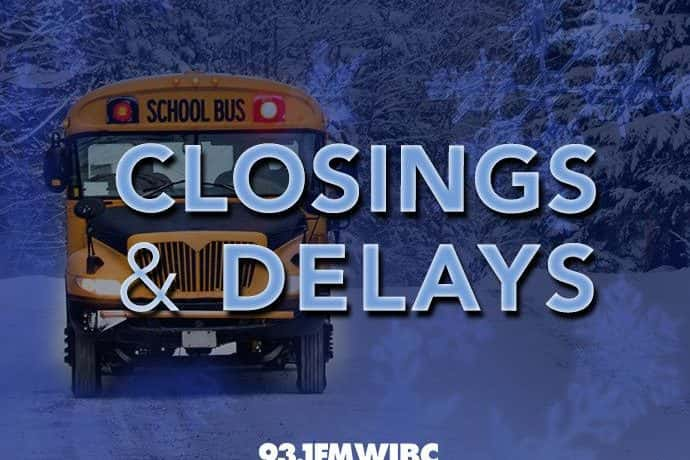Preparing For School Delays: A Winter Weather Advisory Checklist

Table of Contents
Monitoring Weather Forecasts and Alerts
Staying informed is the first step in preparing for school delays. Reliable information is crucial to making timely decisions. Don't rely on just one source; cross-reference several to get a comprehensive picture.
- Check multiple weather sources regularly: The National Weather Service (NWS) website provides official forecasts and warnings. Supplement this with your local news channels and reputable weather apps (like AccuWeather, The Weather Channel). Look for keywords like "winter storm warning," "winter weather advisory," or even "snow day" in your searches.
- Understand weather advisory levels: Knowing the difference between a Winter Weather Advisory, Watch, and Warning is crucial. A Watch means conditions are favorable for severe weather; a Warning means severe weather is imminent or occurring. An Advisory indicates less severe conditions but still warrants caution.
- Sign up for emergency alerts: Your school district and local government likely offer emergency alert systems via text message, email, or mobile app. Register for these to receive immediate notifications about school closures or delays. This is a vital element of your weather preparedness strategy.
Preparing Your Child for School Delays
Even before the first snowflake falls, prepare your child for the possibility of school delays. This preparation will reduce stress and ensure they are safe and comfortable if school is delayed or cancelled.
- Pack extra layers: Ensure your child's backpack contains extra warm clothing: a hat, gloves, scarf, and an extra pair of socks. These are essential items for staying warm if they're waiting for a bus or walk home in frigid temperatures.
- Prepare an emergency kit: A small backpack with non-perishable snacks, a water bottle, and hand warmers can be a lifesaver if your child is unexpectedly delayed.
- Establish clear communication: Designate a reliable contact person (a neighbor, relative, or friend) who can supervise your child if you're unable to get home promptly due to adverse weather conditions. Make sure your child knows how to contact this person.
- Discuss contingency plans: Talk to your child about what to do if school is unexpectedly dismissed. Review the route home, what to do if they get separated from friends, and who to contact in an emergency.
Preparing Your Home for Extended Time Indoors
If a school closure lasts for more than a day, being prepared at home is essential. This involves having enough supplies and activities to make the unexpected downtime enjoyable and safe.
- Stock up on supplies: Keep a supply of non-perishable food items (canned goods, pasta, etc.) and bottled water readily available in case of a power outage. Remember, during a major snow event, stores may be closed.
- Battery power: Ensure you have plenty of batteries for flashlights, radios, and other essential electronic devices.
- Indoor activities: Gather board games, books, puzzles, and other indoor activities to keep your children entertained and engaged during extended periods indoors.
- Heating system check: Make sure your home's heating system is functioning correctly before winter hits. A malfunction could cause significant discomfort and even safety risks during a prolonged power outage.
Planning for Transportation During School Delays
Transportation during school delays or closures can be challenging. Planning ahead ensures your child's safety and minimizes stress.
- School bus protocols: If you rely on school buses, familiarize yourself with the district's delay protocols and communication methods. Knowing how delays will be communicated is critical.
- Alternative transportation: Arrange backup transportation plans in advance. Consider carpooling with neighbors or establishing alternative routes.
- Winter driving safety: If you're driving, check road conditions before you leave and ensure your vehicle is winter-ready (winter tires, antifreeze, ice scraper).
- Hazardous conditions awareness: Be aware of potentially hazardous road conditions like black ice, which can be extremely dangerous.
Conclusion
Preparing for school delays due to winter weather advisories requires proactive planning and awareness. By following this checklist and implementing these strategies, you can ensure your family is prepared for unexpected school closures and winter weather events. Remember to stay informed about weather conditions using reliable sources, and create a comprehensive plan to handle school delays effectively. Don’t get caught off guard; prepare for school delays and keep your children safe this winter!

Featured Posts
-
 Sahrana Glumice Andelke Milivojevic Tadic Emotivni Trenuci Na Groblju
May 20, 2025
Sahrana Glumice Andelke Milivojevic Tadic Emotivni Trenuci Na Groblju
May 20, 2025 -
 Hmrc Contacting Earners Over 23 000 Important Tax Information
May 20, 2025
Hmrc Contacting Earners Over 23 000 Important Tax Information
May 20, 2025 -
 Mkhalfat Malyt Khtyrt Tqryran Dywan Almhasbt 2022 2023 W Mwaqf Alnwab
May 20, 2025
Mkhalfat Malyt Khtyrt Tqryran Dywan Almhasbt 2022 2023 W Mwaqf Alnwab
May 20, 2025 -
 Numerotation Des Batiments A Abidjan Guide Du Projet D Adressage
May 20, 2025
Numerotation Des Batiments A Abidjan Guide Du Projet D Adressage
May 20, 2025 -
 Hmrc Leverages Voice Recognition For Faster Call Handling
May 20, 2025
Hmrc Leverages Voice Recognition For Faster Call Handling
May 20, 2025
Latest Posts
-
 Chicago Cubs Fans Hot Dog Kiss Mimics Lady And The Tramp
May 21, 2025
Chicago Cubs Fans Hot Dog Kiss Mimics Lady And The Tramp
May 21, 2025 -
 Viral Video Cubs Fans Recreate Lady And The Tramp Scene With Hot Dog
May 21, 2025
Viral Video Cubs Fans Recreate Lady And The Tramp Scene With Hot Dog
May 21, 2025 -
 The Underrated Western Neo Noir Featuring Dennis Quaid Meg Ryan And James Caan
May 21, 2025
The Underrated Western Neo Noir Featuring Dennis Quaid Meg Ryan And James Caan
May 21, 2025 -
 Cubs Game Lady And The Tramp Hot Dog Recreation Goes Viral
May 21, 2025
Cubs Game Lady And The Tramp Hot Dog Recreation Goes Viral
May 21, 2025 -
 Klopp Mu Ancelotti Mi Teknik Direktoer Secimi Analizi
May 21, 2025
Klopp Mu Ancelotti Mi Teknik Direktoer Secimi Analizi
May 21, 2025
